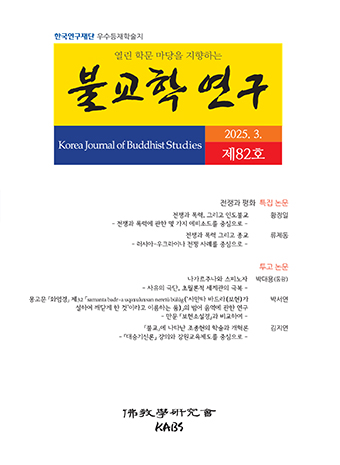Abstract
References
Sorry, not available.
Click the PDF button.
Information
The unified Silla period was the golden age in the history of Pure Land Buddhism in Korea. The study of thought in Pureland Buddhism was done by many monks who came from lots of schools of buddhism and, at the same time, many people in Silla society believed in Amitābha (阿彌陀佛). Lots of monks expressed not only their own ideas about both Amitābha and Pure Land in their writings, but also they wrote commentaries on the Larger Sukhavativyuha (無量壽經). Among them, Wu-liang-shou-jing-lian- yi-shu-wen-zan (無量壽經連義述文讚) written by Jing-xing (憬興) is the longest one that is existing. This article is focused on the forty eight vows of Dharmākara (法藏比丘) in it. Jing-xing (憬興) made relatively long comments on disputed 18th, 20th and 35th vows. About the 18th vow, he insisted that the differences of viewpoints between the Larger Sukhavativyuha and Guan-wu-liang-shou-jing (觀無量壽經) were caused by the capability of living things (衆生). That is to say, teachings of Guan-wu-liang-shou-jing are suitable for the lowest class (下品下生) and those of the Larger Sukhavativyuha are suitable for the three highest of the nine stages of birth (上品三生).According to the capability, the cause of being born in Pure Land (往生因) are different. Similarly the land in which they were born as a result are different. To understand them without inconsistency he recognized the pureland as a dual structure of the land of reward (報土) and the land in which is the transformed body of a Buddha (化土).Although invocation of name of buddha (念佛) is not a direct cause, it could be a cause of being born in pureland (往生因). This point of view is based on the theory of different time (別時意說) in She-da-cheng-lun (攝大乘論) which is also the basis of the 20th vow and the 35th vow. It revealed that he commented on the Larger Sukhavativyuha from the viewpoint of Dharmalaksana School(法相宗).
Click the PDF button.
- Publisher :Korean Association of Buddhist Studies
- Publisher(Ko) :불교학연구회
- Journal Title :Korean Journal of Buddhist Studies
- Journal Title(Ko) :불교학연구
- Volume : 18
- Pages :295~318


 Korean Journal of Buddhist Studies
Korean Journal of Buddhist Studies






